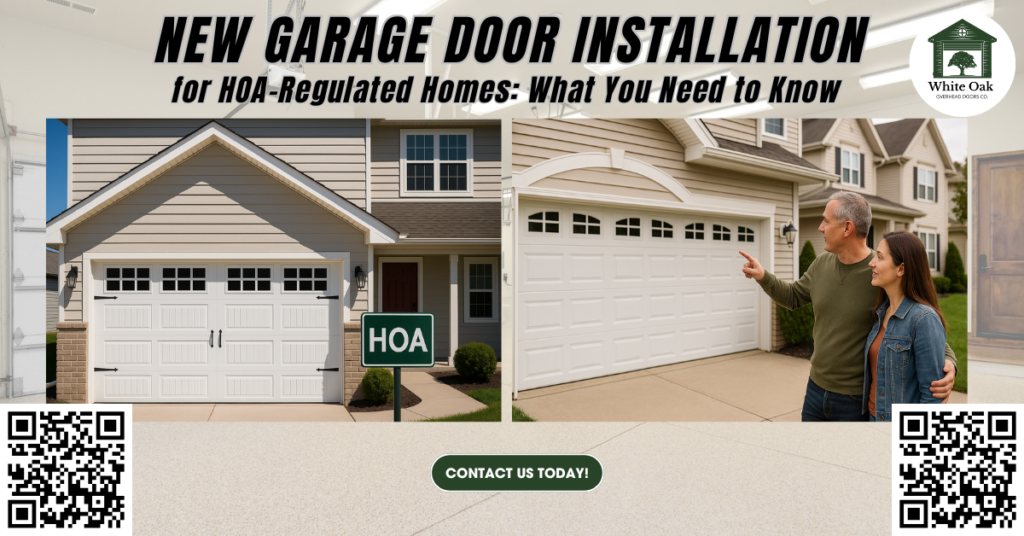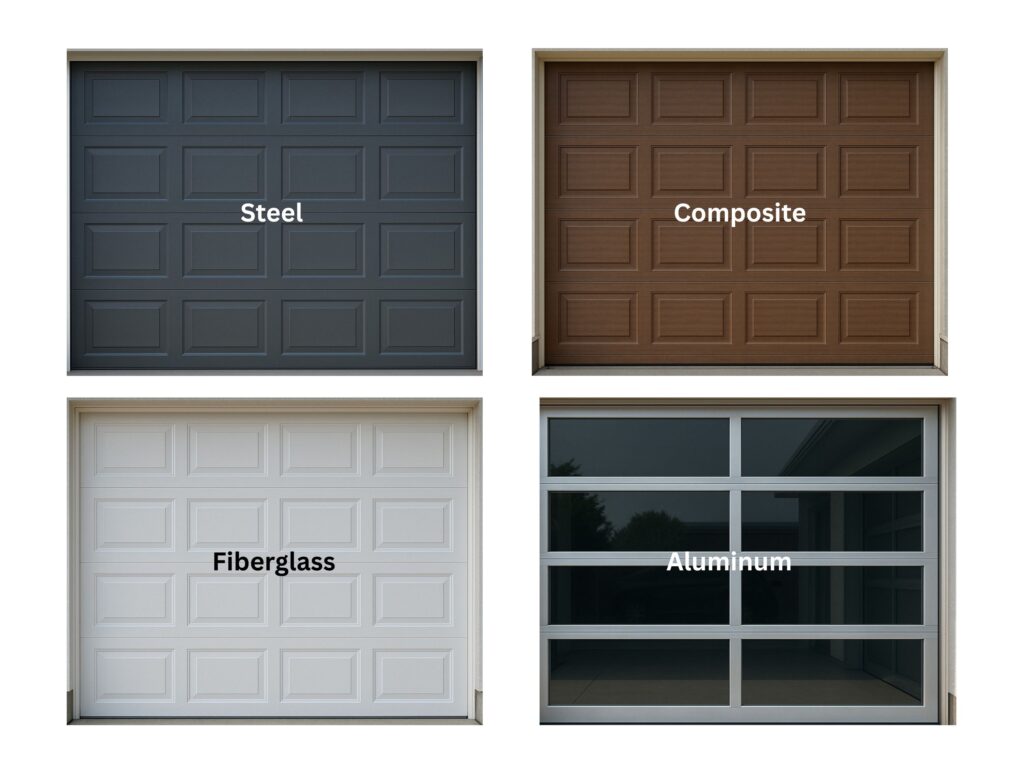New Garage Door Installation for HOA-Regulated Homes: What You Need to Know

When a homeowner in a deed-restricted community in Houston recently replaced their aging, dented garage door with a stylish, modern design, they thought they were upgrading their home’s curb appeal. But instead, they received a violation notice from their Homeowners Association (HOA) demanding a costly door replacement or legal action. Unfortunately, this situation is all too common. HOAs have strict standards for what types of garage doors are acceptable in their communities.
Across the United States, more than 70 million residents live in HOA-regulated neighborhoods. These associations have detailed covenants, conditions, and restrictions (CC&Rs) that govern exterior modifications like fencing, roofing, and new garage door installations. Replacing or installing a garage door without understanding these rules can lead to headaches and unnecessary expenses. Many homeowners are surprised to learn that even small design elements like the type of panel, color, or decorative hardware can result in violations.
At White Oak Overhead Doors Co., we specialize in helping homeowners throughout Houston, TX, and surrounding communities navigate these complexities. Our experienced team of certified installers ensures that your new garage door installation complies with HOA regulations while enhancing your home’s style, security, and energy efficiency. We understand how important it is to make smart investments in your home, and that includes choosing the right materials, insulation levels, openers, and safety features. In this comprehensive guide, we’ll walk you through every step of the process, from choosing the right garage door and opener to understanding labor costs, material options, safety features, regular maintenance, and more.
Understanding HOA Regulations for Garage Doors
What Are HOA Regulations?
HOA regulations are guidelines outlined in the CC&Rs that outline what homeowners can and cannot do to the exterior of their homes. These rules protect the aesthetic harmony and property values of the neighborhood. Regarding garage door installation, the HOA may restrict the type, style, material, and color of the new door. Some communities even dictate the design of the door panels, whether you can install windows, and the decorative hardware that may or may not be allowed. These regulations can vary significantly depending on the neighborhood, and failure to adhere to them can result in penalties, even if the installation is high quality and professionally done.

Why Garage Doors Matter to HOAs
Garage doors are one of the most prominent exterior features of a home. In many suburban and urban neighborhoods, the garage takes up 30% to 40% of the home’s front facade. An inappropriate door design, an outdated model, or a poorly executed installation can detract from the cohesive visual appeal of the entire street. That’s why HOAs monitor door replacement projects closely. They expect residents to follow a standardized installation process that preserves the neighborhood’s architectural integrity. A mismatched or oversized door, an unusual color scheme, or hardware that clashes with the home’s style can all become sticking points.
Common HOA Garage Door Restrictions
Each HOA has unique requirements, but some common restrictions include:
- Only specific color palettes that match or complement the home’s exterior trim and paint
- Approved materials like steel doors, aluminum, or wood composite, depending on neighborhood climate resilience preferences
- Required panel styles (e.g., raised panel, flush panel, carriage-style)
- Window style restrictions (shape, tint, and placement) or bans on windows entirely
- Restrictions on visible decorative hardware like hinges or handles
- Noise level and insulation requirements for garage door openers, particularly in communities with shared walls or closely spaced homes
- Mandated use of safety sensors and auto-reverse functions to meet updated safety standards
Ignoring these can lead to violations, fines, or forced removal of your newly installed garage door. It’s not just about appearances; HOAs also aim to enforce safety, security, and energy conservation standards.
Step-by-Step Guide to HOA-Approved Garage Door Installation
Step 1: Review the HOA’s CC&Rs
Start by obtaining the HOA’s CC&Rs and design guidelines. These documents typically outline all the specifications allowed for doors, including approved garage door styles, acceptable materials, insulation types (such as polyurethane or polystyrene), window limitations, and even opener technology. Knowing this upfront saves time and avoids back-and-forth communication later. If you’re unsure how to interpret the rules, consult with your HOA board or an experienced installer like White Oak Overhead Doors Co. to help clarify the dos and don’ts.
Step 2: Design Your Garage Door
Once you understand the HOA’s criteria, you can start designing your new garage door. Consider factors like:
- Material (steel, fiberglass, aluminum, or composite), which affects durability and weather resistance
- Panel configuration (flush panel, raised panel, recessed panel), which influences the door’s appearance and compatibility with home style
- Insulation (choose an R-value that boosts energy efficiency and helps regulate interior temperatures)
- Color options that blend with your home exterior and HOA-approved palettes
- Window styles (arched, rectangular, clear, or frosted) for aesthetics and natural lighting
- Additional features like smart openers, motion sensors, or battery backups to enhance convenience and security
The right garage door balances function, durability, and visual harmony. At White Oak Overhead Doors Co., we help you select from a wide range of compliant models from top manufacturers like Stanley Garage Door, Amarr, and Clopay. Each product is vetted for its energy efficiency, security features, and maintenance demands.
Step 3: Prepare and Submit Your Proposal
HOAs typically require a formal application that includes:
- Product brochures or manufacturer spec sheets with model numbers and detailed features
- Color swatches and style mock-ups that help visualize the door in context
- A site photo showing the old garage door and proposed upgrade to provide before-and-after comparisons
- Installer information with licenses, insurance certificates, and an installation process overview
- Estimated start and completion dates for the project
We assist homeowners by preparing all these documents to simplify the approval process. Our team is familiar with many HOA boards in Houston and can tailor submissions to each community’s expectations.
Step 4: Wait for HOA Approval
HOA boards often meet monthly, and it can take 2-4 weeks to receive a decision. Don’t start the installation process until you have written confirmation. Skipping this step could result in violation notices or rejection. Some HOAs allow for electronic submissions or fast-track approval for pre-approved models, but always confirm timelines.
Step 5: Schedule Installation with a Professional Team
Once approved, coordinate with a licensed installation team. Our professionals ensure:
- Removal and environmentally responsible disposal of the old door and opener
- Precise measurement of the door frame and opening to avoid installation gaps
- Smooth track and drive carriage alignment for safe operation
- Correct spring system installation (torsion or extension) to support the door weight
- Programming of the garage door opener with secure rolling code technology
- Final adjustments for safe operation, remote access, and noise control
Our team focuses on safe operation, energy-efficient setups, and long-lasting results. We also conduct a full safety inspection, test all features, and walk homeowners through usage and maintenance tips.
Choosing the Right Door and Features
Style & Design
Whether you’re choosing a classic carriage-style door or a sleek modern panel, the garage door design must complement your home’s overall style. Curb appeal matters, especially when the garage occupies a significant portion of the home’s facade. Door panels, bottom panels, and decorative hardware can all enhance the visual impact while complying with community standards. Modern designs often include minimalistic panels and integrated smart technology, while traditional homes benefit from arch-top windows and warm color finishes.
Material Choices
Common HOA-approved materials include:
- Steel: Durable and available in various finishes, resistant to dents and rust when properly coated
- Aluminum: Lightweight and rust-resistant, ideal for humid climates
- Wood Composite: Offers a traditional look without high upkeep, resistant to warping and pests
- Fiberglass: Resistant to humidity and dents, with faux wood finishes available

The materials used affect energy efficiency, cost, security, and longevity. Choose a material that suits your home’s climate, your lifestyle, and the HOA’s durability expectations.
Insulation & Energy Efficiency
Insulated garage doors improve comfort and reduce energy consumption, especially in Houston’s hot climate. Look for doors with high R-values, energy-efficient seals, and insulated panels that help conserve energy in your garage space. A well-insulated door can also reduce noise from the garage door opener and tracks. Choosing an insulated model may also qualify you for energy credits or rebates, depending on your utility provider.
Opener Technology
Modern garage door openers come with a range of options:
- Screw drive carriage systems: Fewer moving parts and good for moderate climates
- Belt drive for quiet operation: Ideal for attached garages and noise-sensitive households
- Chain drive for heavy-duty use: Great for heavier doors, but noisier
- Smart openers with remote access via smartphone apps and integration with home security systems
- Battery backups for power outages ensure operation during storms or grid failures
Safety features like auto-reverse sensors, motion detection, rolling code security, and vacation lock mode are essential for both functionality and compliance.
Labor, Cost, and Installation Time
Factors That Affect Cost
The overall cost of your new garage door installation depends on several factors:
- Door size and type: Single garage doors cost less than double doors or custom sizes.
- Material selection: Steel is generally more affordable, while wood or composite materials may carry a premium.
- Insulation value: Higher R-values increase energy efficiency but add to material cost.
- Garage door opener technology: Smart features, battery backups, and quiet operation systems come at a premium.
- Additional hardware and design elements: Decorative handles, faux hinges, and specialty glass raise the final bill.
- Labor costs: Based on the complexity of removal and installation, and whether structural modifications are needed.
A basic door installation might cost around $1,200–$1,500, while a custom, insulated, smart-enabled double garage door installation can cost upwards of $4,500. At White Oak Overhead Doors Co., we provide detailed estimates and walk you through every pricing component.
Labor and Timeline
The typical installation process is completed in a single day. Here’s how the timeline breaks down:
- Arrival and setup: Inspection of the existing garage door and workspace prep.
- Removal of the old garage door: Detachment from the track, disassembly of the panels, and safe disposal.
- Track and spring installation: Mounting new tracks, adjusting brackets, and configuring torsion or extension springs.
- Door panel assembly: Securing the new panels, including the bottom panel, middle, and top panel, with the appropriate insulation and sealants.
- Opener installation: Fitting and programming the garage door opener, whether chain, screw, or belt drive.
- Safety test and calibration: Checking sensors, auto-reverse features, balance tests, and opener remote integration.
- Final walkthrough: Demonstrating how to use the opener, providing maintenance tips, and leaving documentation for HOA compliance.
Even complex projects typically fall within a one-day window unless structural changes to the frame or electrical work are needed.
What Happens If You Don’t Comply?
Violations and Fines
Installing a door without HOA approval can result in:
- Written notices of non-compliance
- Daily fines that accumulate until corrected
- Mandates to remove the non-compliant door and replace it with an approved option
- Additional legal fees if the HOA regulations escalate to formal dispute resolution
We’ve seen homeowners spend thousands on a new door only to remove and reinstall another one due to HOA rejections. Working with professionals like White Oak Overhead Doors Co. from the beginning can save time, money, and frustration.
Legal & Financial Setbacks
In severe cases, ongoing violations can lead to HOA liens on your property. This complicates refinancing and resale efforts. A non-approved garage door installation may be flagged during property inspections, requiring retroactive compliance that could delay closing dates or reduce home value.
Maintenance Requirements in HOA Communities
Regular Maintenance
Most HOAs require homeowners to keep their properties, including garage doors, in well-maintained condition. A poorly maintained garage door can violate community appearance standards. Regular upkeep ensures smooth operation and extends the door’s lifespan.
Common maintenance requirements include:
- Cleaning the panels and hardware regularly to prevent corrosion and maintain appearance
- Lubricating moving parts such as tracks, hinges, and springs every six months
- Testing safety sensors and auto-reverse systems monthly for reliable protection
- Repainting or resealing wood or composite doors annually or as needed
Our preventative maintenance packages at White Oak Overhead Doors Co. include thorough inspections, lubrication, opener diagnostics, weather seal replacement, and more.
Tips for Long-Term Upkeep
- Inspect weather seals every season and replace any cracked or worn strips
- Check the opener for proper response time and test backup batteries quarterly
- Keep remote access systems updated and monitor app integration for security patches
- Schedule professional maintenance annually to identify small issues before they become major repairs
Well-maintained doors perform better, look better, and stay compliant with your HOA guidelines.
Local Compliance Support: A Case Study
In a gated community in Memorial, Houston, a homeowner selected a frosted glass roll-up door. It was sleek, energy-efficient, and modern, but their HOA didn’t approve of the material or style. We helped them draft a variance request with detailed design justifications, energy-saving specs, and references to similar door styles in the area. We included detailed renderings, product certifications, and examples of code-compliant installations in similar communities.
The result? A successful appeal and a stunning new garage door installation approved by the HOA. This project illustrates the value of working with experienced professionals who understand not just garage doors, but also the importance of advocacy and communication with your HOA.
How Can White Oak Overhead Doors Co. Help You?
When you live in a deed-restricted neighborhood, every exterior upgrade must follow specific rules. Replacing or upgrading your garage door is no exception. But with the right guidance, it’s a smooth, rewarding process.
At White Oak Overhead Doors Co., we make HOA compliance simple. Our team of licensed professionals is here to:
- Guide you through your HOA’s door replacement process step-by-step
- Recommend the right garage door styles, panels, materials, and insulation options
- Provide brochures, documents, and assistance for HOA proposal submissions
- Ensure every detail, from the drive carriage to the safety sensors, meets industry standards
- Install your new door efficiently and safely
- Offer affordable maintenance plans to help with long-term upkeep
We proudly serve homeowners across Houston, TX, including The Heights, River Oaks, West University, Midtown, Bellaire, and surrounding communities. Our team understands the importance of detail from the bottom panel to the opener logic board; every component matters.
Let’s make your next garage door installation effortless and HOA-approved.
Call (832) 990-1595 or visit us at 1440 Studemont St, Houston, TX 77007 to schedule your free consultation.
Your ideal garage door, energy-efficient, stylish, and HOA-compliant, is just one call away.
Frequently Asked Questions (FAQs)
1. Can I appeal an HOA denial for a garage door design I want?
Yes, most HOAs have a variance request process where you can submit a detailed appeal along with supporting documentation like photos and specs.
2. Are there quiet garage door opener options for HOA communities with noise rules?
Absolutely—belt drive and wall-mounted openers are known for quiet operation and are ideal for attached garages or neighborhoods with noise regulations.
3. Will a new garage door installation increase my home value in an HOA?
Yes, especially when it improves curb appeal, energy efficiency, and security—all of which are attractive to potential buyers.
4. Does the HOA regulate the interior features of my garage door, like insulation or opener type?
Generally no; most HOAs focus on the exterior appearance, not internal features like insulation type or smart opener systems.
